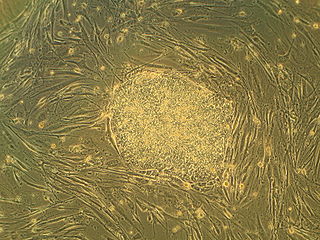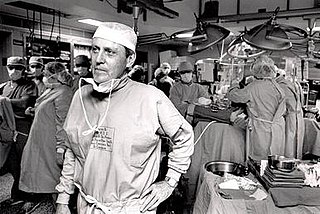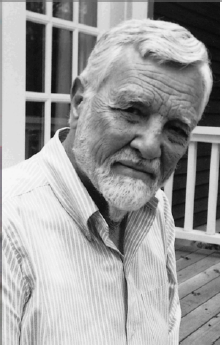Medical anthropology studies "human health and disease, health care systems, and biocultural adaptation". It views humans from multidimensional and ecological perspectives. It is one of the most highly developed areas of anthropology and applied anthropology, and is a subfield of social and cultural anthropology that examines the ways in which culture and society are organized around or influenced by issues of health, health care and related issues.

The Temerty Faculty of Medicine is the medical school of the University of Toronto. Founded in 1843, the faculty is based in Downtown Toronto and is one of Canada's oldest institutions of medical studies, being known for the discovery of insulin, stem cells and the site of the first single and double lung transplants in the world.
Arthur Michael Kleinman is an American psychiatrist, social anthropologist and a professor of medical anthropology, psychiatry and global health and social medicine at Harvard University.

Edward Donnall "Don" Thomas was an American physician, professor emeritus at the University of Washington, and director emeritus of the clinical research division at the Fred Hutchinson Cancer Research Center. In 1990 he shared the Nobel Prize in Physiology or Medicine with Joseph E. Murray for the development of cell and organ transplantation. Thomas and his wife and research partner Dottie Thomas developed bone marrow transplantation as a treatment for leukemia.

Paul Edward Farmer was an American medical anthropologist and physician. Farmer held an MD and PhD from Harvard University, where he was a University Professor and the chair of the Department of Global Health and Social Medicine at Harvard Medical School. He was the co-founder and chief strategist of Partners In Health (PIH), an international non-profit organization that since 1987 has provided direct health care services and undertaken research and advocacy activities on behalf of those who are sick and living in poverty. He was professor of medicine and chief of the Division of Global Health Equity at Brigham and Women’s Hospital.

Regenerative medicine deals with the "process of replacing, engineering or regenerating human or animal cells, tissues or organs to restore or establish normal function". This field holds the promise of engineering damaged tissues and organs by stimulating the body's own repair mechanisms to functionally heal previously irreparable tissues or organs.

Thomas Earl Starzl was an American physician, researcher, and expert on organ transplants. He performed the first human liver transplants, and has often been referred to as "the father of modern transplantation." A documentary, entitled "Burden of Genius," covering the medical and scientific advances spearheaded by Starzl himself, was released to the public in 2017 in a series of screenings. Dr. Starzl also penned his autobiography, "The Puzzle People: Memoirs Of A Transplant Surgeon," which was published in 1992.
In medical anthropology, naturalistic disease theories are those theories, present within a culture, which explain diseases and illnesses in impersonal terms. George Foster explains naturalistic disease theory as following an "equilibrium model" in which health results from ideal balances of well being appropriate to one's age, condition, and environment. Imbalances in these systems result in illness through impersonal and systematic mechanisms. One example of a naturalistic disease theory is the theory expressed in western medicine or biomedicine, which links disease and illness to scientific causes. This leaves any personal liability for the disease out of the equation, and the diseases are attributed to organisms such as bacteria or viruses, accidents, or toxic substances.
Murder for body parts also known as medicine murder refers to the killing of a human being in order to excise body parts to use as medicine or purposes in witchcraft. Medicine murder is viewed as the obtaining of an item or items from a corpse to be used in traditional medicine. Its practice occurs primarily in sub-equatorial Africa.
Nancy Scheper-Hughes is an anthropologist, educator and author. She is the Chancellor’s Professor Emerita of Anthropology and the director and co-founder of the PhD program in Critical Medical Anthropology at the University of California, Berkeley. She is known for her writing on the anthropology of the body, hunger, illness, medicine, motherhood, psychiatry, psychosis, social suffering, violence and genocide, death squads, and human trafficking.

Shinya Yamanaka is a Japanese stem cell researcher and a Nobel Prize laureate. He is the former director of Center for iPS Cell Research and Application and a professor at the Institute for Frontier Medical Sciences at Kyoto University; as a senior investigator at the UCSF-affiliated Gladstone Institutes in San Francisco, California; and as a professor of anatomy at University of California, San Francisco (UCSF). Yamanaka is also a past president of the International Society for Stem Cell Research (ISSCR).

Ronald D. Guttmann MD, FRCPC, FCAHS, was born in Minneapolis, Minnesota in 1936 and received his post secondary school education at the University of Minnesota, receiving a B.A. Magna Cum Laude in 1958, and a B.S. and M.D. degree in 1961. He did his Medical Internship at the University of California San Francisco, military service in the USNR at the Tissue Bank, National Naval Medical Center, Bethesda, Medical Residency on the II & IV (Harvard) Medical Service at Boston City Hospital, and a Research & Clinical Fellowship at the Peter Bent Brigham Hospital(now Brigham & Women's Hospital) and Harvard Medical School. In 1969, he was appointed associate in medicine at the Peter Bent Brigham Hospital and instructor in medicine at Harvard Medical School, and permanently moved to Montreal, Canada in 1970 to become director of the transplantation service at the Royal Victoria Hospital and McGill University Clinic and associate professor of medicine, McGill University Faculty of Medicine. During his academic career he directed an active basic and clinical research laboratory program focused on transplantation immunobiology, immunogenetics, immunosuppression, and long term-complications of transplant patients. He also developed an interest in social and ethical issues of transplantation, organ shortage, and human rights abuses.
Sarah Franklin is an American anthropologist who has substantially contributed to the fields of feminism, gender studies, cultural studies and the social study of reproductive and genetic technology. She has conducted fieldwork on IVF, cloning, embryology and stem cell research. Her work combines both ethnographic methods and kinship theory, with more recent approaches from science studies, gender studies and cultural studies. In 2001 she was appointed to a Personal Chair in the Anthropology of Science, the first of its kind in the UK, and a field she has helped to create. She became Professor of Social Studies of Biomedicine in the Department of Sociology at the London School of Economics in 2004. In 2011 she was elected to the Professorship of Sociology at the University of Cambridge.

Charles Miller Leslie (1923-2009) was an American medical anthropologist, who was an avid contributor of published works in his branch of anthropology. Leslie’s career was influential to the shaping of medical anthropology, as his works have inspired other medical anthropologists to further research and popularize anthropological concepts which includes medical pluralism, social relations of therapy management, the relationship between state and medical systems, and health discourse. Leslie’s main focus within medical anthropology has been the study of Asian medical systems, specifically Ayurvedic, Unani, and Chinese medicine.
Margaret Allen is an American cardiothoracic surgeon and an academic at the Benaroya Research Institute. She was the first woman to perform a heart transplant and is a former president of the United Network for Organ Sharing.
Vijaya Lakshmi Melnick is an India-born American academic specializing in biological and environmental sciences and immunology. She is Professor Emeritus of Biological and Environmental Sciences at the University of the District of Columbia. She was the First Vice President and then Co-President of the International Health Awareness Network, an affiliate of the United Nations. She holds memberships on the boards and executive committees of national and international organizations related to either health and education or both. She has written several research papers and books.

Seth M. Holmes is the Martin Sisters Endowed Chair Associate Professor of Medical Anthropology and Public Health at the University of California Berkeley. He also serves as founding co-chair of the Berkeley Center for Social Medicine, co-director of the MD/Ph.D. Track in Medical Anthropology coordinated between UC Berkeley and UCSF and is attending physician in the Department of Medicine in the Alameda County Medical Center. A cultural anthropologist and physician, Holmes focuses on social inequalities, immigration, ethnic hierarchies, health and health care. His work has provided a particularly strong ethnographic critique of behaviorism in medicine.
Mary Margaret Clark (1925–2003) was an American medical anthropologist who is credited with founding the sub-discipline of medical anthropology.

Margaret E. Billingham was a pathologist at Stanford University Medical Center, who made significant achievements in the early recognition and grading of transplant rejection following cardiac transplantation, known as 'Billingham's Criteria'. She also described chronic rejection and techniques in heart endomyocardial biopsy.
Thomas Schlich is a German-Canadian historian of medicine known for his work on the history of surgery.










